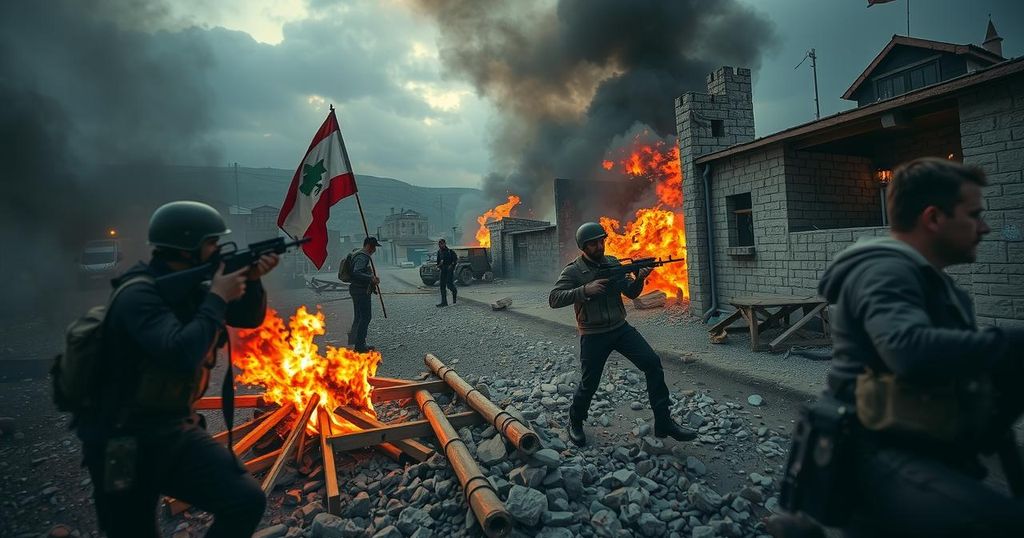The ceasefire between Israel and Hezbollah is increasingly endangered following recent military confrontations, including Hezbollah’s mortar attack and subsequent Israeli airstrikes that resulted in civilian casualties. Both sides blame each other for violating the truce brokered by international powers, which aims to stabilize the region following escalating violence. Central to the continuation of peace is an international committee tasked with monitoring ceasefire adherence.
The fragile ceasefire established between Israel and Hezbollah is now under severe strain following a series of military exchanges. Hezbollah initiated the conflict by launching two mortar shells targeting an Israeli military outpost, prompting Israel to respond with a substantial airstrike campaign—its most extensive since the truce took effect. This exchange resulted in the deaths of nine individuals in southern Lebanon, marking a critical escalation in hostilities.
Observers highlighted the increasing severity of the situation, citing the events of the previous day as the most perilous moment since the ceasefire started. While the Israeli armed forces asserted that their targets were Hezbollah militants and their supporting infrastructure, they reiterated their commitment to the ceasefire agreement. Both parties have accused one another of infringing the terms mandated by the truce, which was brokered by the United States and France.
According to the ceasefire guidelines, Israel is prohibited from offensive missions in Lebanon, while Lebanon is obliged to prevent any aggression from armed groups such as Hezbollah. In response to a mortar attack that reportedly caused no casualties to Israeli forces, Prime Minister Benjamin Netanyahu emphasized a need for a robust retaliation. Meanwhile, Israel’s Defense Minister, Israel Katz, warned against a collapse of the ceasefire, stating that a failure would remove existing separations between Israel and Lebanon.
Hezbollah characterized its mortar launch as a defensive maneuver, claiming it sought to warn against Israel’s alleged violations of the ceasefire, which they contend have been ignored by monitoring authorities. Lebanese media reported that prior Israeli airstrikes had resulted in fatalities, increasing tensions. Political analysts interpreted Hezbollah’s actions as an assertion of strength, reinforcing their readiness against any escalation.
Lebanese parliamentary representatives indicated that Hezbollah’s missile fire served as a message, reaffirming their presence and capability to retaliate against Israeli aggression. Furthermore, Lebanese parliamentary speaker Nabih Berri cited at least 54 ceasefire breaches by Israel, including air offensives and incidents of property destruction. He has urged immediate oversight from the international committee responsible for monitoring the ceasefire stipulations.
The effectiveness of ongoing negotiations and adherence to the ceasefire now substantially rests with an international committee established to investigate these breaches. Chaired by a U.S. army general and supported by various representatives from relevant nations and organizations, the committee aims to harmonize communication among the conflicting parties.
Despite the noted resurgence of violence, officials from the Biden administration expressed cautious optimism, observing a dramatic decline in confrontations. No Secretary John Kirby remarked on the significant reduction in hostilities since the ceasefire was implemented, indicating that while progress has been made, evident challenges still lie ahead.
The tensions between Israel and Hezbollah have a long and complex history, rooted in regional conflict and territorial disputes. The recent ceasefire agreement was brokered following a significant escalation of hostilities involving rocket attacks and military operations. The involvement of major powers, including the United States and France, reflects the international community’s concern over regional stability. Observers often note that both parties have historically engaged in reciprocal provocations, making the management of ceasefires and adherence to agreements particularly challenging. As recent events demonstrate, maintaining a fragile peace requires constant monitoring and intervention to prevent escalations into broader conflict.
In summary, the situation between Israel and Hezbollah remains precarious following the recent exchanges of fire that threaten the ceasefire established through international mediation. Both parties are entangled in a cycle of accusations regarding violations, highlighting the obstacles faced in sustaining peace. The effectiveness of the international monitoring committee will be crucial in facilitating communication and enforcing compliance with the ceasefire terms. Although there has been a notable decrease in violence, ongoing tensions necessitate vigilance to avoid a resurgence of conflict.
Original Source: www.bbc.co.uk







